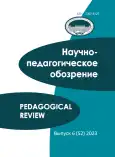No 6 (2023)
GENERAL EDUCATION
Design features of the educational topic learning environment (on the example of mathematics)
Abstract
 7-20
7-20


Graphic techniques of working with text in geography lessons
Abstract
 21-31
21-31


The use of language material on the example of Russian proverbs in Mongolian textbooks of the Russian language for grades 7–9 in secondary schools in Mongolia
Abstract
 32-41
32-41


Analysis of school essays-reviews of the book read by different generations
Abstract
 42-50
42-50


HIGHER EDUCATION
Experience of using a point-rating system for the discipline “Russian language of business communication” in Sevastopol State University
Abstract
 51-59
51-59


Formation of regional linguistic knowledge of foreign philology students using booktrailer technology
Abstract
 60-68
60-68


Self-assessment of competencies by students in the disciplines of the professional cycle of technical areas of training
Abstract
 69-78
69-78


Mastering the discipline “Modern means of evaluating learning outcomes” at a pedagogical university
Abstract
 79-86
79-86


German/French language teachers university training system in the context of competence activities and professionally directed educational model
Abstract
 87-95
87-95


Linguistic and cultural potential of the philosophical text in the practice of teaching Russian as a foreign language
Abstract
 96-105
96-105


Development of the creative potential of the future teacher in the process of professional training (on the example of teaching natural sciences)
Abstract
 106-112
106-112


HISTORY AND METHODOLOGY OF EDUCATION
Ideas of domestic 20th century educators on upbringing of a collective-oriented person
Abstract
 113-121
113-121


Development of human potential as an actual context for the transformation of the education system in Russia
Abstract
 122-133
122-133


Educational opportunities of virtual educational laboratories: analysis of current practice
Abstract
 134-142
134-142


PSYCHOLOGY
Qualitative characteristics of students’ involvement in educational activities (in the view of lecturers and students)
Abstract
 143-153
143-153


Personal security concepts in the scientific space of psychological knowledge
Abstract
 154-163
154-163


Quality of life plans in late adolescence
Abstract
 164-171
164-171


Integral characteristics of memory in boys and girls in early adolescence: correlations of indicators, gender differences
Abstract
 172-185
172-185


Professional prospects of modern teenagers
Abstract
 186-193
186-193


Applied aspects of the problem of the development of psychological cyber resilience in the structure of professional training of specialists
Abstract
 194-202
194-202











